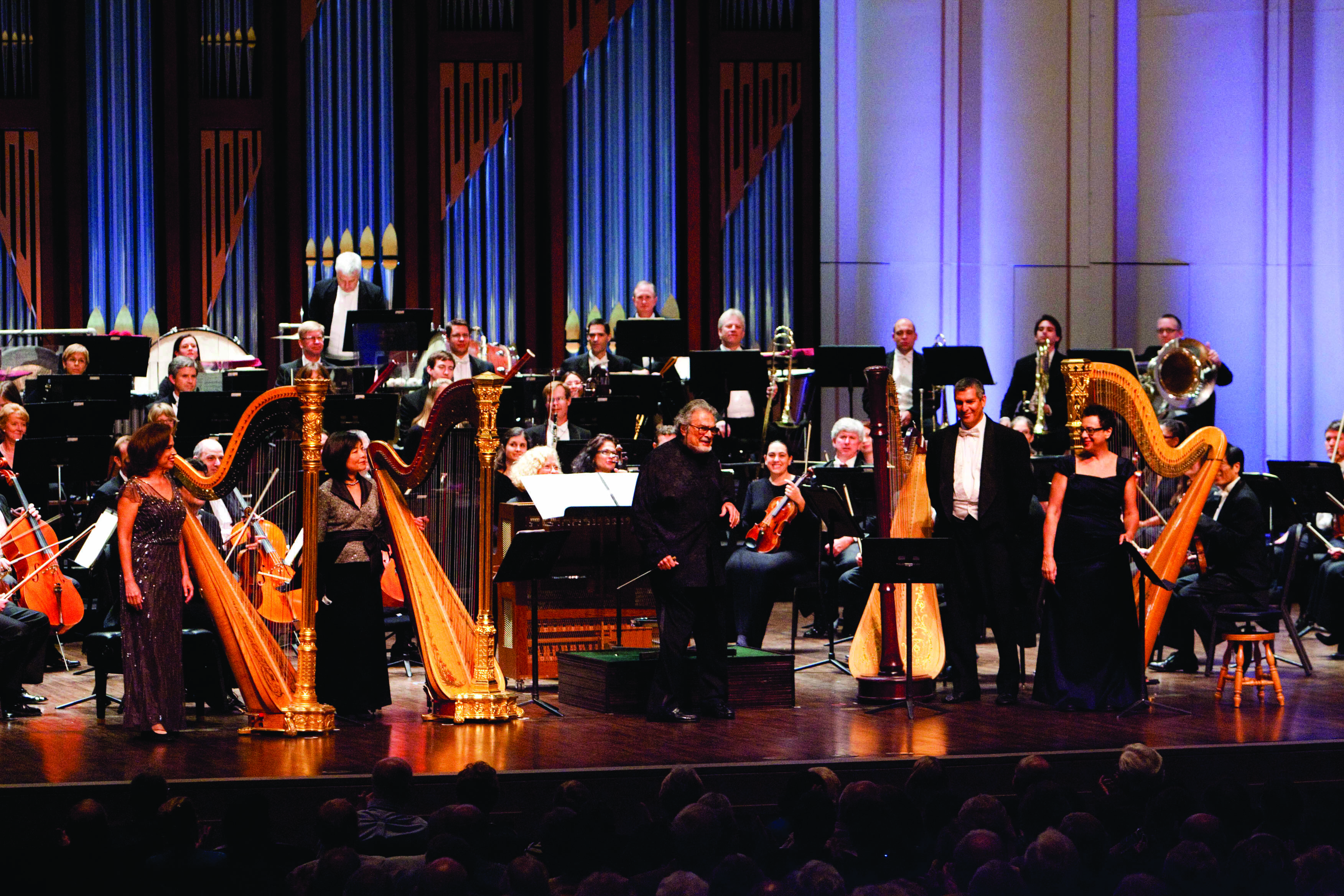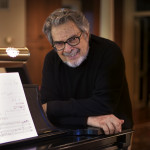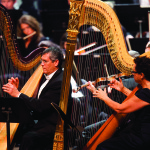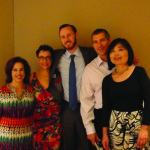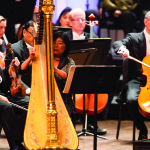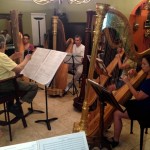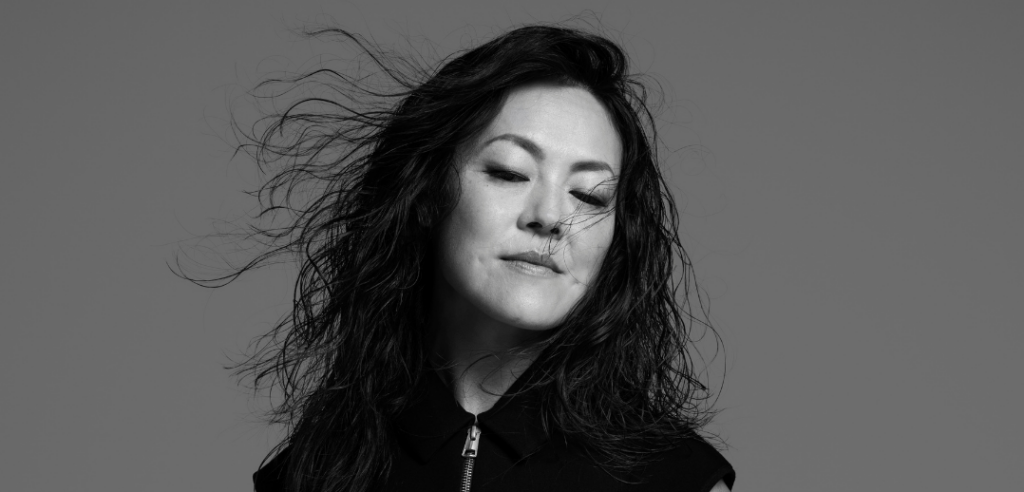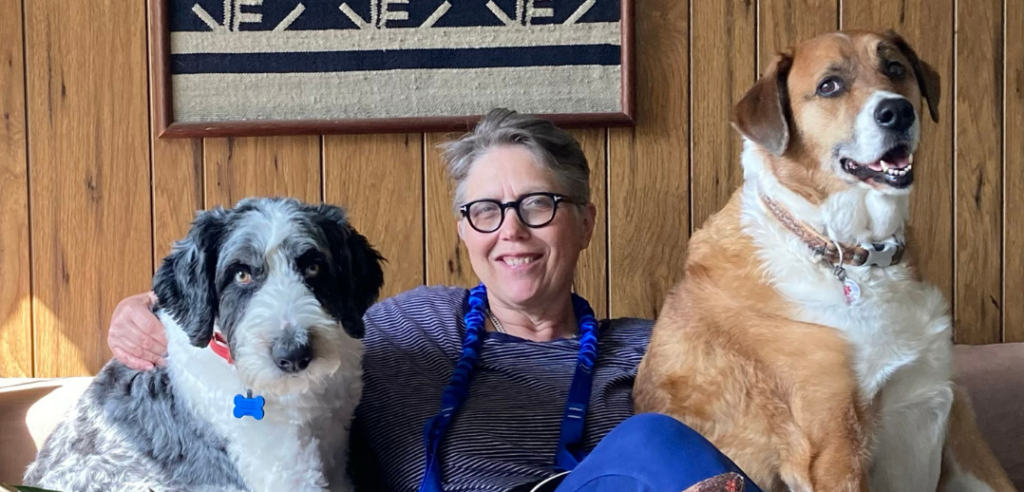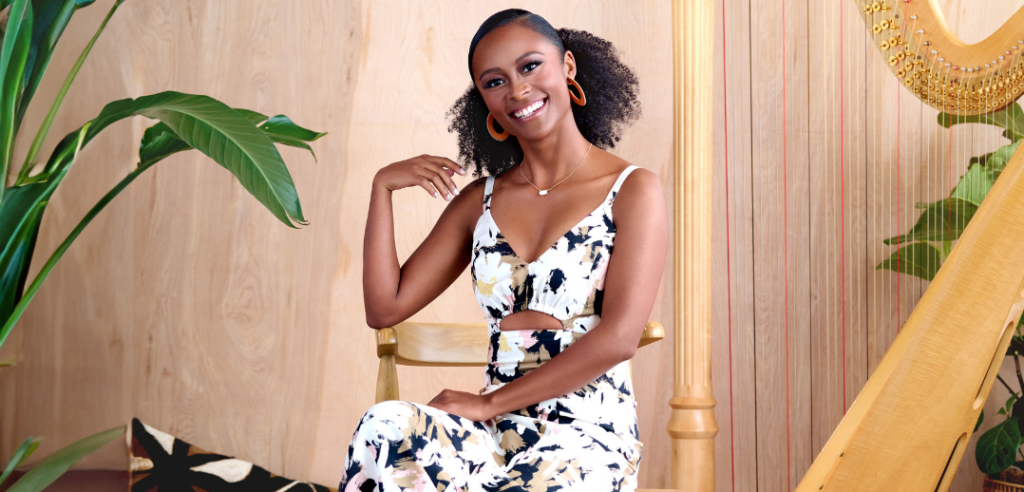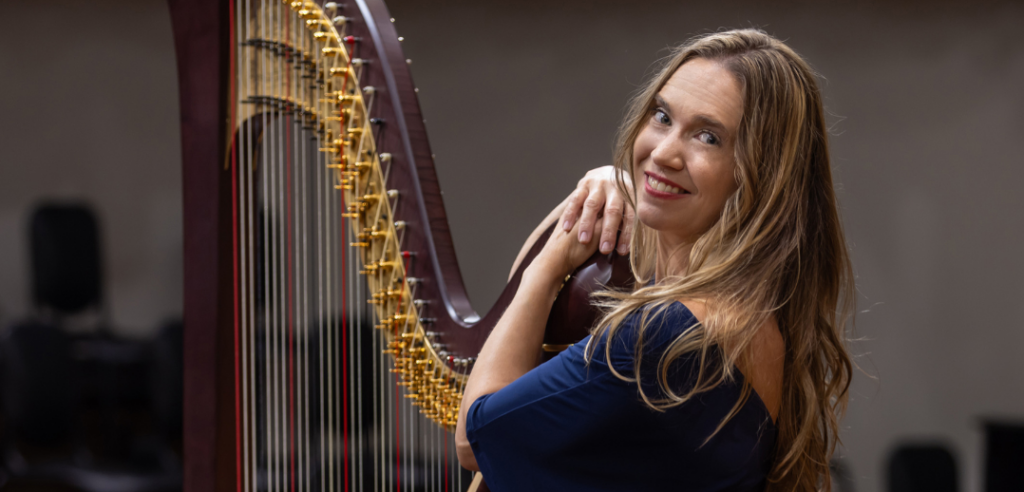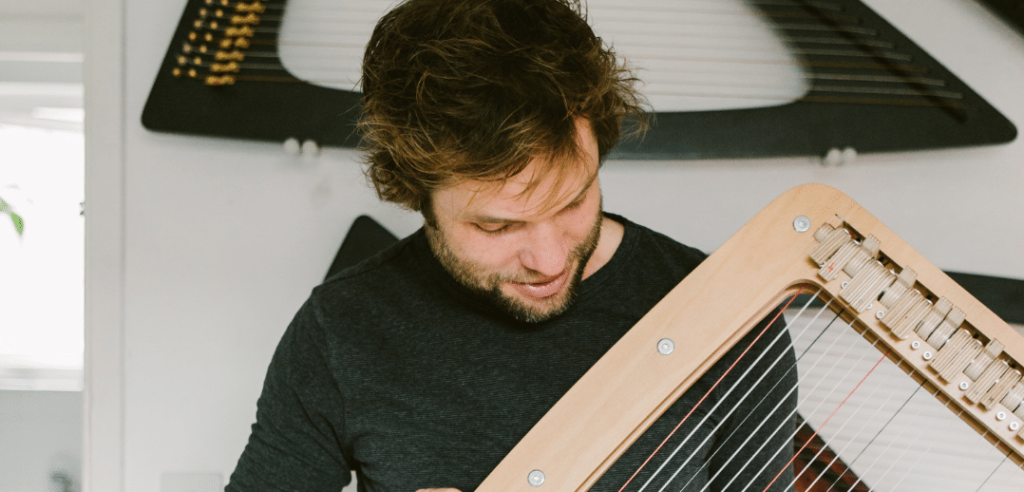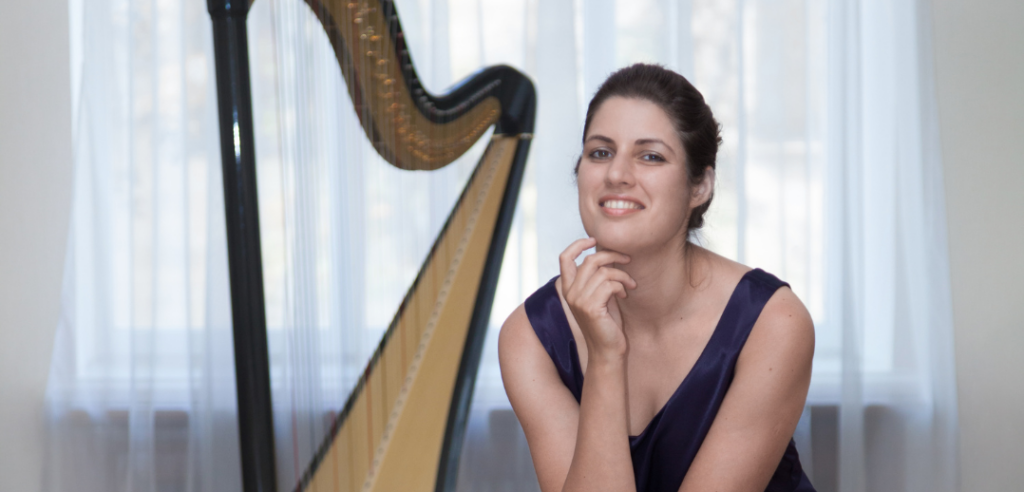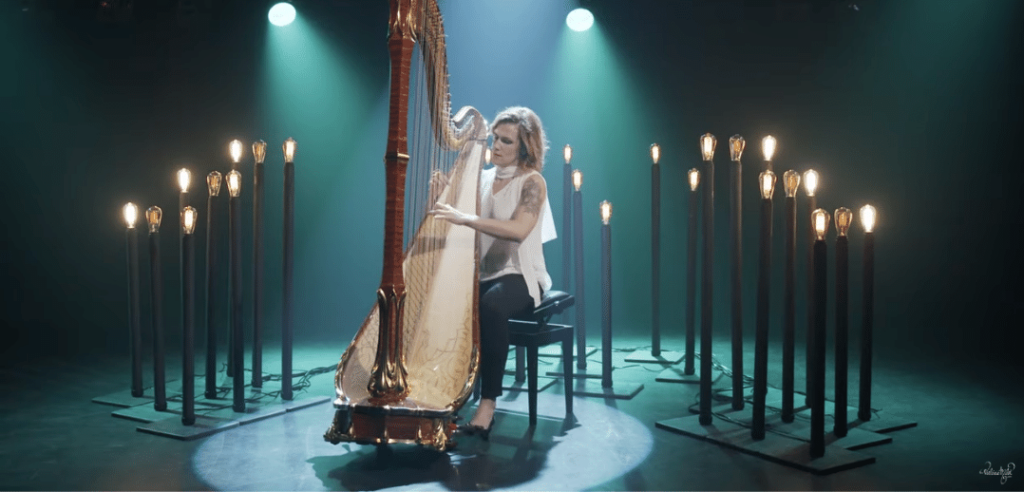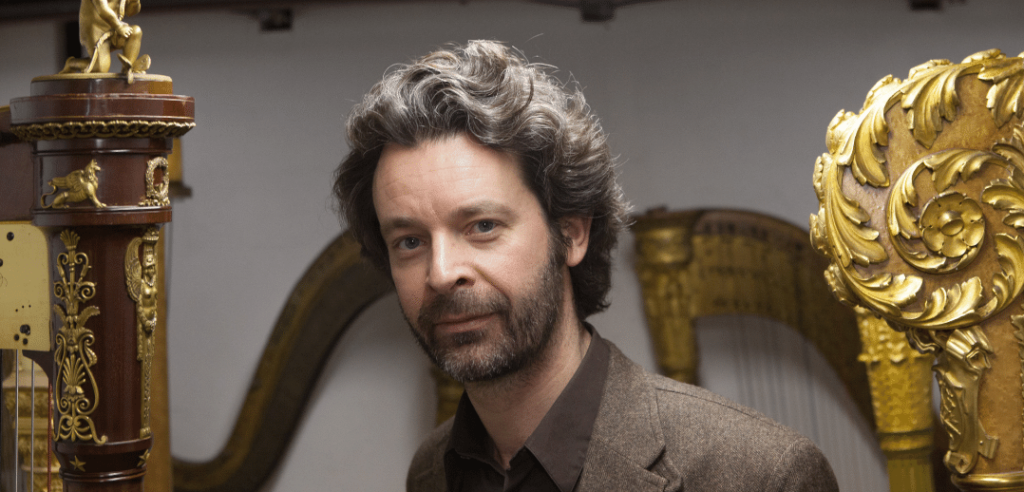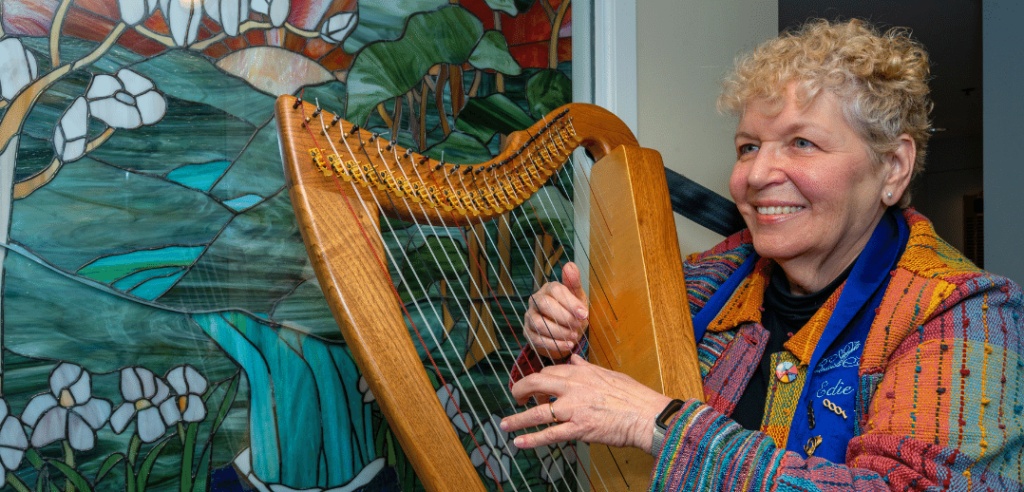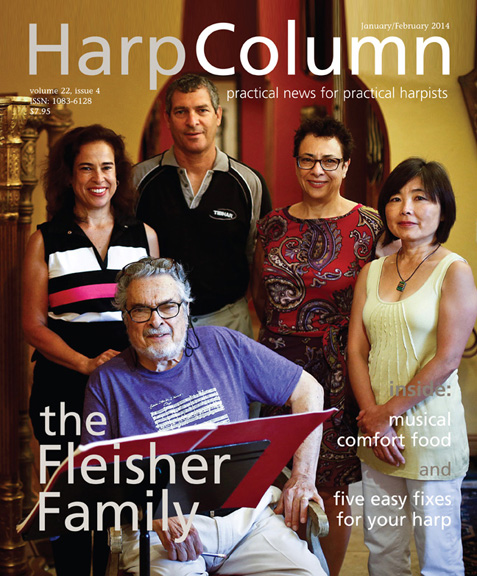The premiere of a new concerto for four harps is enough to make headlines. When it is composed, conducted, and performed by musicians in one family? Well, that’s enough to make history.
—by Charlene Connor
- Premiering “Fantasia for Four Harps and Orchestra” are, (from l. to r.) Leah Fleisher, Kayo Ishamaru, Leon Fleisher (conducting), Dickie Fleisher, and Deborah Fleisher. “There is no question that Dad is a tough act to follow,” says Dickie.
- Siblings Dickie and Deborah Fleisher playing together on harps 1 and 2 for “Fantasia.”
- Nicholas Jacobson-Larson (center) enjoys a moment with the four harpists who premiered his concerto in Naples last fall. Jacobson-Larson is related by marriage to all the performers.
- Kayo Ishamura performs the harp 3 part for “Fantasia.”
- The family rehearses the four-harp concerto they premiered with the Naples Philharmonic. Leon Fleisher conducts all three of his children and daughter-in-law (from l. to r.) Deborah Fleisher, Dickie Fleisher, Kayo Ishamaru, and Leah Fleisher.
There are certain family names that are synonymous with their chosen professions. Politics has the Kennedy family, American football has the Manning family, and the harp world? Well, we have the Fleisher family. Siblings Deborah and Dickie Fleisher are both professional harpists in Florida—Dickie performs with the Naples Philharmonic and Deborah teaches at the University of Miami. Their younger sister Leah, though not a full-time harpist, is an accomplished player in her own right. Dickie is married to Kayo Ishamura, Principal Harpist with the Jacksonville Symphony. The Fleisher siblings all started studying the harp with their grandmother, Nettie Druzinsky, who among her many accomplishments was the first female conductor on Broadway. Their uncle was longtime Chicago Symphony Orchestra harpist Eddie Druzinsky. And their father? Just one of the foremost pianists of the last century, Leon Fleisher.
Last October when we heard that the Naples (Fla.) Philharmonic was premiering a four-harp concerto performed by four members of the Fleisher family (siblings Deborah Fleisher, Dickie Fleisher, Leah Fleisher, and Dickie’s wife Kayo Ishamura), conducted by their father, Leon Fleisher, and written by yet another family member, composer Nicholas Jacobson-Larson, we knew it was an event we couldn’t miss. Ft. Lauderdale harpist Charlene Connor sat down with the four Fleisher siblings in Naples just before the premiere to find out more about the concerto and this fascinating musical family.
Harp Column: I can’t believe that we are having a world premiere of a four-harp concerto, probably the first four-harp concerto ever. First, I just wanted to find out about this concerto that you’re performing this weekend, Fantasia for Four Harps and Orchestra, written by another family member, Nicholas Jacobson-Larson. I think that makes it a collaboration of six family members—the four harpists, the composer, and your father, Leon, as the conductor. Can you tell me how this came about—the commissioning of this work and coming up with the idea for four harps?
Deborah: Yes, we went on a cruise last summer—a family cruise on the Black Sea.
HC: I was wondering about that because you told me about that incredible cruise.
Deborah: Yes, and Dad had the idea after the cruise.
HC: It was a small cruise ship, right? Eighty-four people and 15 were Fleisher family members! You all got to go because then you did all the performing. You did concertos and duos and all kinds of solo concerts—what a wonderful family vacation that was!
Deborah: Except for getting the harps over there. That was something…
Kayo: No. Getting the harps there was fine, coming back was the problem!
[protection_text]
HC: Yes, Kayo was telling me about shipping them back. You were in Istanbul and then suddenly were told that no, we can’t ship them. Luckily she came up with the idea of asking the cruise ship if they would bring them back because they were going back to Rome. Then you were able to arrange to get the harps back from Rome, because you had initially gotten them from Florida to Rome.
Dickie: For anyone who is going to do that in the future, it’s over three times the price to ship (a harp) back as it is shipping it over.
HC: But at least you got them back and they weren’t stuck in Istanbul!
Leah: Right, never to be seen again. [Laughs]
HC: So, I understand this concerto was commissioned for the 25th anniversary of the Naples Philharmonic?
Leah: Yes, Dad was invited back to conduct the opening concert.
Dickie: He played the Ravel Piano Concerto for the Left Hand here two years ago with Michael Stern conducting. Then he was invited back to play and conduct this season. He suggested to our new CEO Kathleen van Bergen that a four-harp concerto be commissioned from his nephew, Nicholas Jacobson-Larson (a prominent film composer in Hollywood), for the 25th anniversary and the concert be a real family affair with his three children and his daughter-in-law featured as the harp soloists and his wife (Katherine Jacobson Fleisher) playing the Mozart Concerto for Two Pianos with him. She was enthusiastically receptive to the idea, and that is how it all came about.
HC: I saw the billboard out front advertising “Leon Fleisher and Family” and thought that was a great advertising promo! Did any of you have input on the writing of the piece? Did you consult at all with the composer?
Deborah: Yes, we did. Nick is based in L.A., and as he was composing he had several phone and Skype conversations with all of us. He also consulted with L.A. studio harpist Gayle Levant.
HC: Well, what are you looking forward to the most about performing this weekend together?
Dickie: Sunday morning. [Laughs]
HC: What unique challenges does performing with family present, and what distinct advantages does it present over performing with those with whom you don’t have that history and connection? You all have strong personalities and are all wonderful musicians in your own right, so I’m curious what it is like working together.
Kayo: It’s a family so you can say things without being patient, but then, you’re living with them. You can’t get away from them! [Laughs]
HC: That’s got to be a bit challenging because you can speak your mind, but then you have to know that it can come back to haunt you too. [Laughs] You said you got together this summer but you are spread over three areas in Florida—Naples, Miami Beach, Jacksonville—and you’re in Maryland, Leah. So that had to be challenging.
Deborah: When we first got the music, Dickie, Kayo, and I were in Jacksonville. We Skyped with Dad when we were looking at it initially. Then about a month later we all met up in Chicago. Kayo plays with Grant Park in the summer and Dad was performing at Ravinia and teaching at the Steans Institute. Dickie was there too so Leah and I flew in, and Nick came from L.A., and we had three very concentrated days together in Chicago in Eddie’s (Druzinsky) apartment.
HC: Okay, tell us, Leah—I’m going to ask you because you’re the youngest one—what was it like growing up in a musical family? From your grandmother, Nettie Druzinsky, to your uncle, Edward Druzinsky, former Principal Harpist of the Chicago Symphony and whose son Michael is here with us, and then, of course, your father, Leon. I can’t imagine having so much talent around you. How did it feel being the youngest one growing up in that?
Leah: Well, I didn’t know anything else, so that was the way it was. It only became a little more of a challenge as I got older, especially having everybody being harpists. But you know, I pursued the professional career like everyone else did. I mean, I have done freelance work; I’ve certainly done my share of playing. I think it gives you an ear for music.
HC: And I often wonder why none of you ended up on piano.
Dickie: There is no question that Dad is a tough act to follow. [Laughs]
HC: What else would you like to tell me about this experience? I’m looking forward to hearing it in concert tonight, but from what I could hear backstage, the harmony sounds kind of Gershwin-esque, almost reminiscent of Porgy and Bess. And what I thought was really good was how I was hearing a dialogue between the harps and the orchestra. There were times when the orchestra was underneath you, but there were a lot of times where it was back and forth, and it seemed like it was going from one harp to another but it was such a smooth transition.
Deborah: Well that was one of his intentions. He wants the audience to get the effect of harp to harp to harp to harp—the sound not stopping, but us passing it on.
Kayo: Except Nick wanted [the arrangement of the harps on stage to be] one, two, three, four [left to right as the audience sees the stage]. We were practicing that way but when we rehearsed at the hall we reversed the order to make it easier to hear [left to right as the audience sees the stage: harp 4, harp 3, conductor, harp 2, harp 1].
Deborah: For months we had been doing it 1, 2, 3, 4.
Kayo: But then we got the idea, why don’t we switch it?
Deborah: And everybody’s happy.
HC: Now in the cadenza, was it trading off one-two-three-four?
Deborah: Yes. It passes off.
HC: Who was one, two, three, four?
Deborah: I was one, Dickie was two, three was Kayo, and four was Leah. By age. [Laughs]
HC: That’s true! That was very diplomatic. [Laughs] The oldest to the youngest. I like that! I was impressed by how musical it all sounded. It sounded like one harp, which made me think, “Wow, this is really well balanced. They did a great job of matching harps and sounds.”
Deborah: Well, that’s also Dad. Dad was insisting that whoever came next had to do what the first person did. Dad’s been a taskmaster. [Laughs]
HC: As he should be, as a parent and as a conductor. I think that’s wonderful. I was listening to him when he was giving instructions to the orchestra, and he wasn’t like some of the tyrannical conductors of the past. He says what he wants and knows how to get it without being mean, obnoxious, or cruel.
Dickie: Dad’s on another level, I think, than all of us and the orchestra. And when he is teaching us these concepts, it’s not a quick grasp. I mean, he’s been doing it since he was five years old. And for all of us, we’re trying to understand this concept. You can’t learn it overnight. So he’s working with us, but it’s not something any of us had growing up. It’s just a different approach to music.
Deborah: It’s been an incredible learning experience.
HC: I think we should talk a little bit about your musical background. I think you all started with your grandmother, didn’t you?
Leah: Not Kayo, but the three of us.
HC: Right, just the three of you. I remember going over to your house on the beach and seeing your grandmother. She was quite a character!
Deborah: You know, you asked the question about why the harp, and certainly the parameter was Nana.
HC: Right. Because of your grandmother. You were around her.
Deborah: She had such an exciting musical life. She played with Charlie Parker and Charlie Mingus. She played with Peggy Lee at Birdland and she was in the pit of a lot of Broadway shows. Nana just exuded that enthusiasm and love. We just wanted to do what she did.
Leah: And Michael reminded us that she literally was the first female conductor on Broadway.
HC: She conducted on Broadway?
Deborah: Well, she was a pianist too. She was the leader of the band.
HC: Are there any plans for you to do this piece together after this weekend?
Deborah: We hope so.
HC: What are your family gatherings like? Do you play together? Do you get together and play just for fun and play for each other?
Dickie: We get together and criticize each other. [Laughs] Blow up. [Sound effects] But it’s family, and at the end of the day we put our egos in our pockets, and hopefully we learn and become better from it.
Leah: And then we go out to eat! [Laughs]
HC: Well, I think it’s wonderful that this work was commissioned and gave you a chance to play together and work with your dad. I hope that the concerto gets rave reviews and gets a lot of future performances.
Dickie: And not just by us. I’m sure the demand from the harp world should be great. It’s a wonderful piece and hopefully it will inspire more. •






